YOUR JOURNEY - MISTAKES
Redefining well-being through the best practices of Jungian psychoanalysis
Mistakes – changing our perspective
“The greatest mistake a man can ever make is to be afraid of making one.” Elbert Hubbard
Mistakes are decisions or actions or even the lack of action that we fear we will regret. Mistakes usually lead to some degree of pain, a sense of loss, feelings of shame and even struggles. It is a natural instinct to try and protect ourselves from those feelings – we procrastinate and avoid or struggle to make decisions. Most of us see mistakes in a negative light and we generally are our own worst critics, often holding ourselves to unrealistic standards. So many of us do not give ourselves the grace we so easily give to others when it comes to making mistakes.
But we need to learn to appreciate our mistakes. If we don’t make mistakes, it’s because we aren’t trying anything new. Mistakes are how we learn; they are how we grow and how we deal with them has the capacity to impact our future positively or negatively – it all depends on our perspective. Changing our perspective is never easy and forgiving ourselves requires a conscious effort. Melanie Koulouris says it best, “There is no sense in punishing your future for the mistakes of your past. Forgive yourself, grow from it, and then let it go.”
Together we will walk through the steps of acceptance, forgiveness, learning, and appreciation as we change our perspective around mistakes.
For now, think about your perceptions of mistakes –
- How do you view mistakes?
- Are you able to forgive yourself or do you hold onto that mistake beating yourself up about it?
- What emotions do you attach to mistakes?
How do mistakes impact you?
“We all make mistakes, have struggles, and even regret things in our past. But you are not your mistakes, you are not your struggles, and you are here now with the power to shape your day and your future.” Steve Maraboli
We often mistakenly believe that our mistakes define us, we let them become part of our identity, but we are not our mistakes. We need to ensure that we stop our inner critic from rehashing our mistakes and filling our minds with negative thoughts that pull us into that cycle of self-loathing or pity. We interpret our mistakes as personal failures that can never be fixed, and this keeps us stuck in the past. Sometimes previous mistakes hold us back, they prevent us from moving forward, and from trying new things because we are scared to fail. Fear of making mistakes can paralyse us. We are under this illusion that we need to be perfect, that we need to do everything correctly the first time.
How are your mistakes impacting your choices?
It’s time to grab your journal and think about your past mistakes. There is definitely no need to delve into each and every one, just pick a few – you’ll intuitively know which ones to choose. Trust your inner wisdom.
- Which of your mistakes hold you back?
- What is the worst thing that happened as a result of your mistake?
- Were you able to learn from it or did it paralyse you?
“I’ve missed more than 9000 shots in my career. I’ve lost almost 300 games. 26 times, I’ve been trusted to take the game’s winning shot and missed. I’ve failed over and over and over again in my life. And that is why I succeed.” Michael Jordan
As Albert Einstein once said, “Anyone who has never made a mistake has never tried anything new.” What if we turn our fear of making mistakes into something positive? What if we embraced our fear of making mistakes and overcame them? What if we looked at fear as an indicator that we are growing and challenging ourselves?


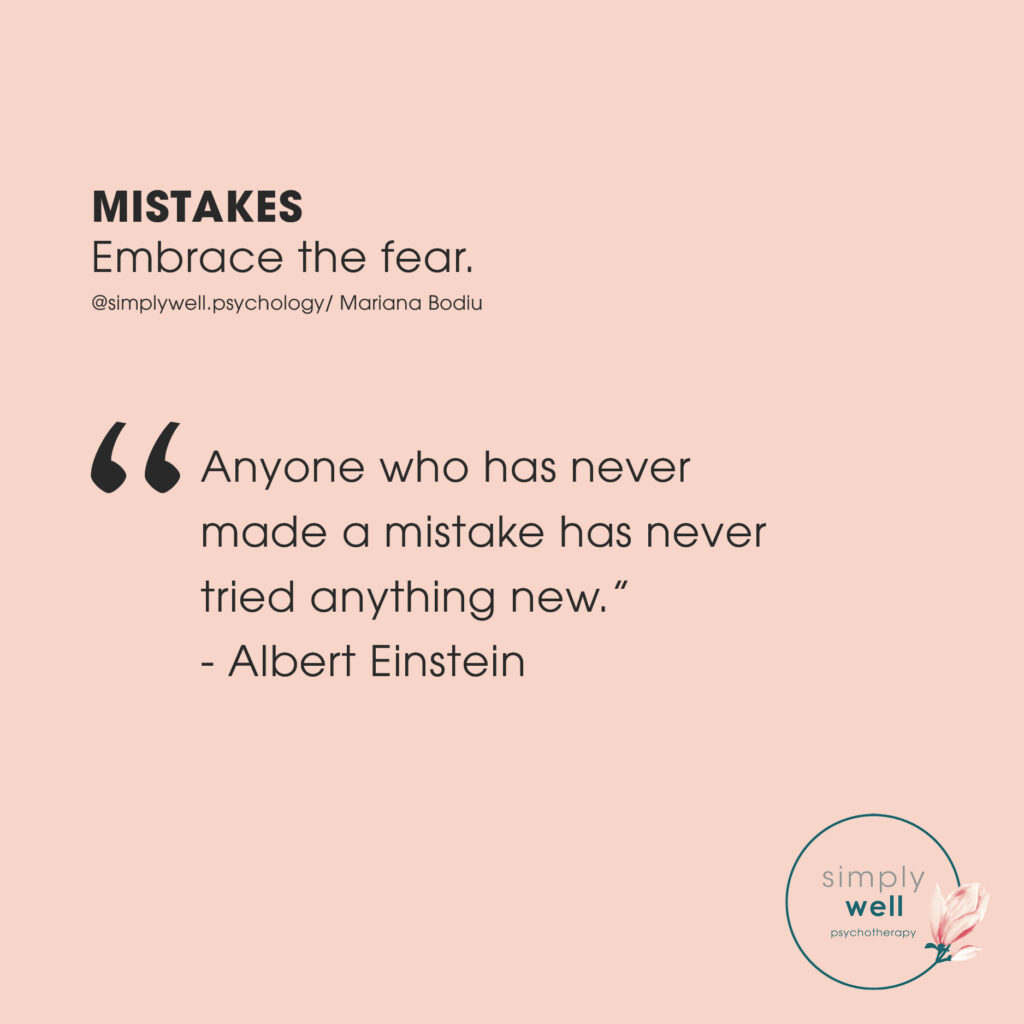
Mistakes – moving towards acceptance
“We cannot change anything until we accept it. Condemnation does not liberate, it oppresses.” Carl Jung
We first need to accept that mistakes will happen, that it is part of life. A life spent avoiding mistakes will be a life unlived. Accepting our mistakes allows us to move forward but before we can accept them, we need to acknowledge them, and this can be painful and leave us feeling vulnerable. But as we’ve said before, where there is great discomfort, there is great learning! This is not about berating or condemning yourself, this is about acknowledging and admitting past mistakes. You cannot forgive what you do not know. Sometimes admitting our mistakes can be difficult for our ego and self-image.
Once you have acknowledged and admitted a mistake, you can no longer hide it, and you are faced with your own imperfections. Our ego doesn’t like to lose, it likes to win all the time and the temptation to blame others is the perfect way of passing on responsibility for our own actions. But admitting fault is extremely important not only for our personal growth but also for sustaining and strengthening relationships. Some of us are not even aware that we have made mistakes and that is more dangerous. We often find it easier to see the mistakes of others than our own. As Carl Jung said, “We always see our own unavowed mistakes in our opponent.”
For today take time to think about how you react to mistakes, do you take ownership, or do you find a way to blame others? Are you surprised when others point out your mistakes? Are you oblivious to your own mistakes? Are there specific types of mistakes that make you feel more uncomfortable and are more difficult to admit?
Liberate yourself through acknowledgement, acceptance and action
It takes guts and humility to admit mistakes. Admitting we’re wrong is courage, not weakness.” Roy T Bennett
Through acknowledging or admitting our mistakes, we are able to accept them for what they are and then we can take empower ourselves by taking action. We need to always remember that we are all inherently good and no one makes mistakes on purpose. Our mistakes and flaws help us develop and become stronger. It is only when we are scared of looking weak, vulnerable, and for most of us that awful feeling of looking stupid that we try to blame external circumstances – have you noticed how easily we find evidence to back up that belief that we were not responsible?
Freeing yourself from past mistakes – yes, it’s journal time!! Writing things down always gives us clarity and often provides unexpected insights.
Acceptance isn’t just for yourself, it is for others as well. This is twofold, we need to be able to accept mistakes that others make but we also need others to accept ours! Are there people in your life who battle to accept mistakes? Take time to think about how this impacts you – let’s be honest, none of us like that ‘friend’ who loves to remind us of our past mistakes, and yet, we do that to ourselves! What do people get out of reminding each other of their past mistakes? Often it can come from a place of insecurity, reminding others of their mistakes makes us feel better about our own. It can also be because we haven’t forgiven them for those mistakes, or we don’t feel that they experienced the appropriate consequences.
Those few mistakes we thought about last week, it’s time to go deeper. The first step is to acknowledge and admit your mistake – write about your mistakes in as much detail as possible, don’t think too much, just let the words flow. Release your mistakes from your mind onto the pages of your journal.
How you write will give you incredible insights into how that particular mistake has impacted your life, but we will look at those next week.

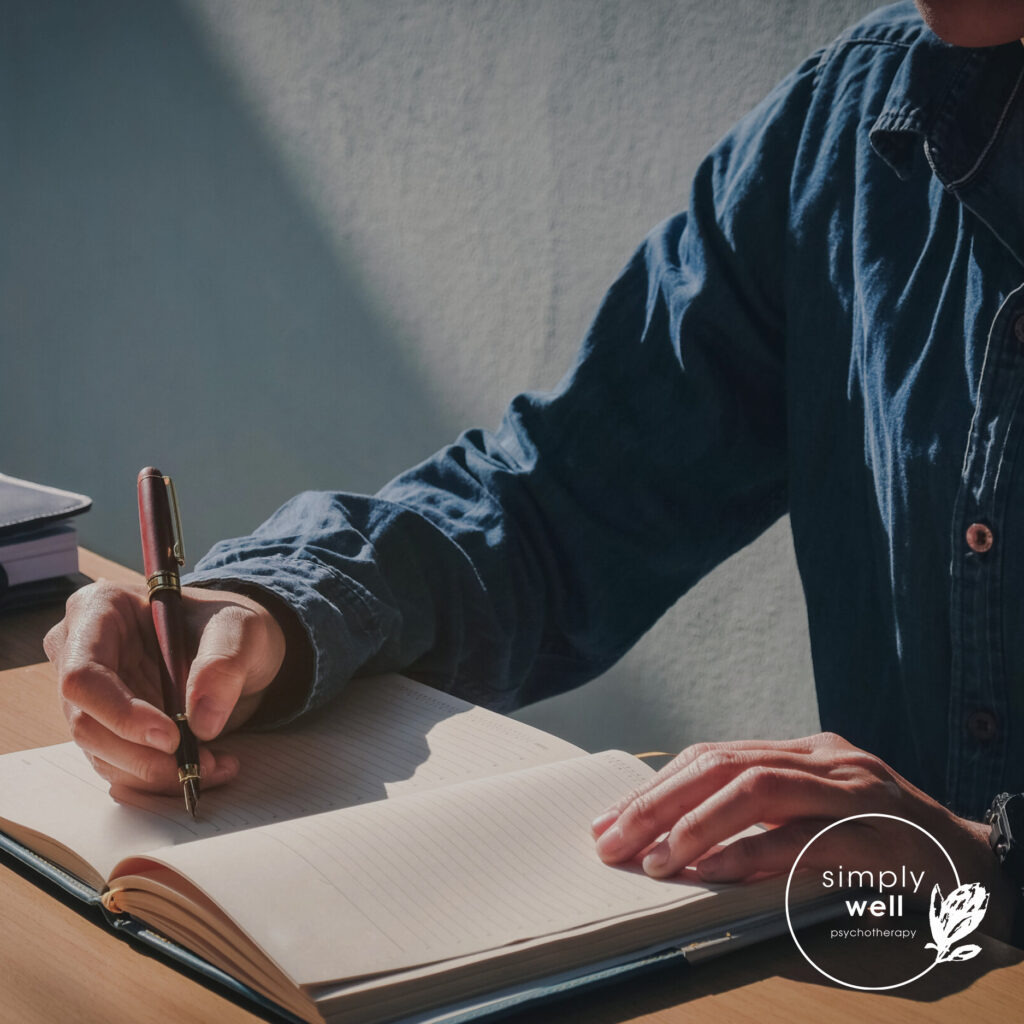
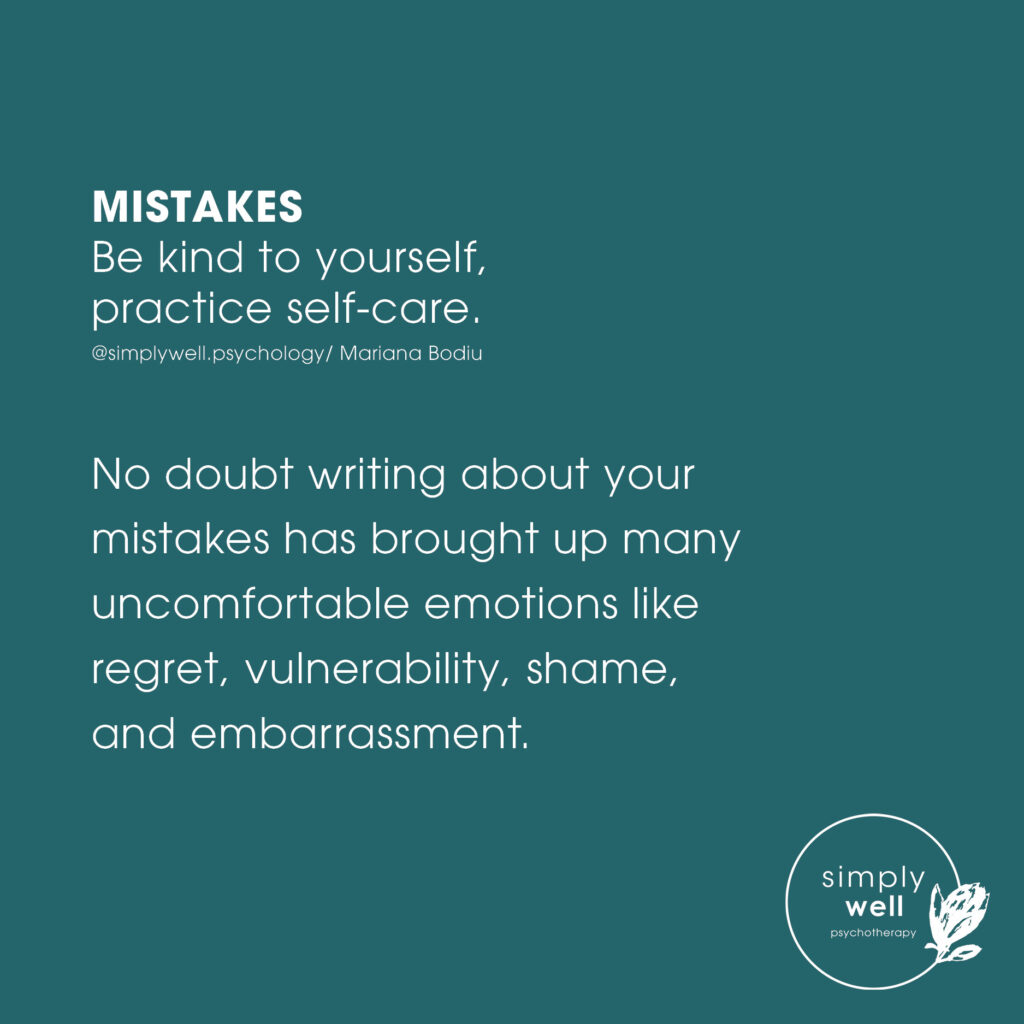
“Mistakes are always forgivable if we have the courage to admit them.” Bruce Lee
No doubt writing about your mistakes has brought up many uncomfortable emotions like regret, vulnerability, shame, and embarrassment. Sitting with our emotions is always part of the process but releasing them is what heals us. It is time to be kind to yourself, practice self-care and perhaps this weekend we can add a bit of bravery to that list. Perhaps there is a mistake that held you back, something you could try again. Or perhaps this weekend you can try something that you are scared to fail at.
And if you do make a mistake again – does it really matter?
Appreciation through learning
“It’s not our mistakes that define us. It’s the lessons we learn that show our true character.” Cassia Leo
At first, it may seem strange to appreciate our mistakes, especially if you are someone who beats yourself up about them. When it comes to mistakes, we have a few choices.
- You can beat yourself up and let your inner critic free – you don’t need anyone else to make you feel bad, your negative self-talk does that for you.
- You can constantly remind yourself of your past mistakes – it often amazes me at how I still berate myself for mistakes I made years and years ago – mistakes that everyone else except me has forgotten about.
- You can stop doing that particular thing or trying new things in case you make another mistake – imagine if you gave up the first time you tried to walk or ride your bike. You needed to continue to try, you needed persistence and courage.
OR
- You can accept you made a mistake, appreciate the learning that came from it and try something new.
- If your actions caused another pain, you could apologise and become more mindful of your words. The same applies to yourself. We all appreciate an apology as it is an acknowledgment that someone caused us pain or distress. That apology will strengthen your relationship with yourself and with others.
- You can see mistakes for what they really are – opportunities for learning, opportunities for change, and opportunities for improvement and growth.

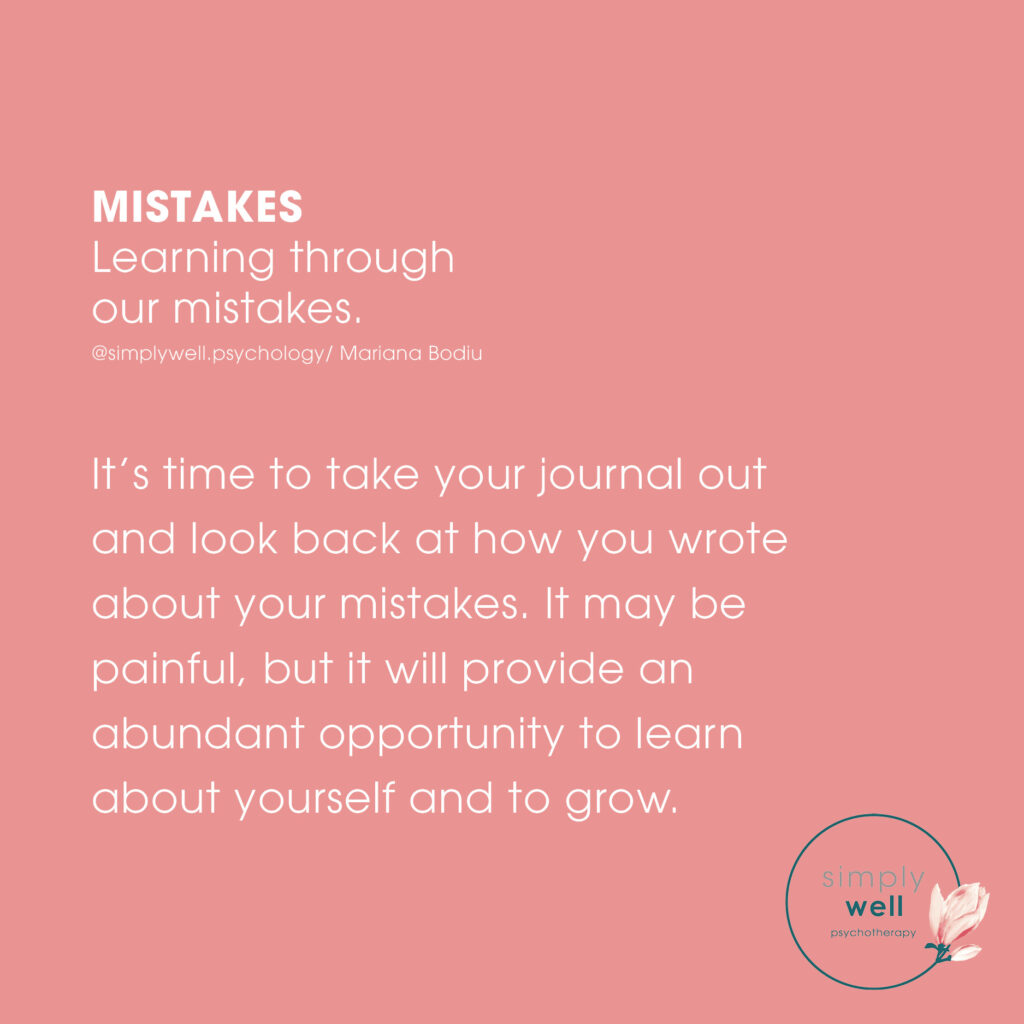

Learning through our mistakes
“The only real mistake is the one from which we learn nothing.” Henry Ford
It’s time to take your journal out and look back at how you wrote about your mistakes. It may be painful, but it will provide an abundant opportunity to learn about yourself and to grow. Mistakes provide us with insights that are necessary for us to grow psychologically, emotionally, and spiritually. They are fundamental to our learning process. When we look back over our writings, we are looking from the perspective of an investigator. We are looking back at our notes without emotion. We are looking for insights – we are here to learn about ourselves. Pay attention to patterns, particularly to the emotions you attach to those mistakes. Do you take responsibility for your mistakes, or do you shift the blame to others?
- How did you describe your mistakes?
- Are you making similar mistakes?
- Did anything positive come from your mistakes? Remember without mistakes there would be no innovation.
One of the most important questions to ask yourself is why are you still holding onto this mistake? Is it because you feel you didn’t suffer enough? Do you feel it is unforgivable? Is it because you keep repeating it? What action can you implement to let it go? If the person you loved the most in the world had made the same mistake, what advice would you give them? Would you forgive them? Would you believe they could move forward? Would you give them grace?
“There are no mistakes in life, only lessons. There is no such thing as a negative experience, only opportunities to grow, learn and advance along the road of self-mastery. From struggle comes strength. Even pain can be a wonderful teacher.” Robin Sharma
We are back to changing our perspective, look at your mistakes as lessons. They are your teachers and without them you would not grow, you would not come up with new ideas and as Robin Sharma says you certainly wouldn’t advance along the road of self-mastery.
Embrace your learning opportunities 😊. Denis Waitley phrases it beautifully, “ Mistakes are painful when they happen, but years later a collection of mistakes is called experience.”

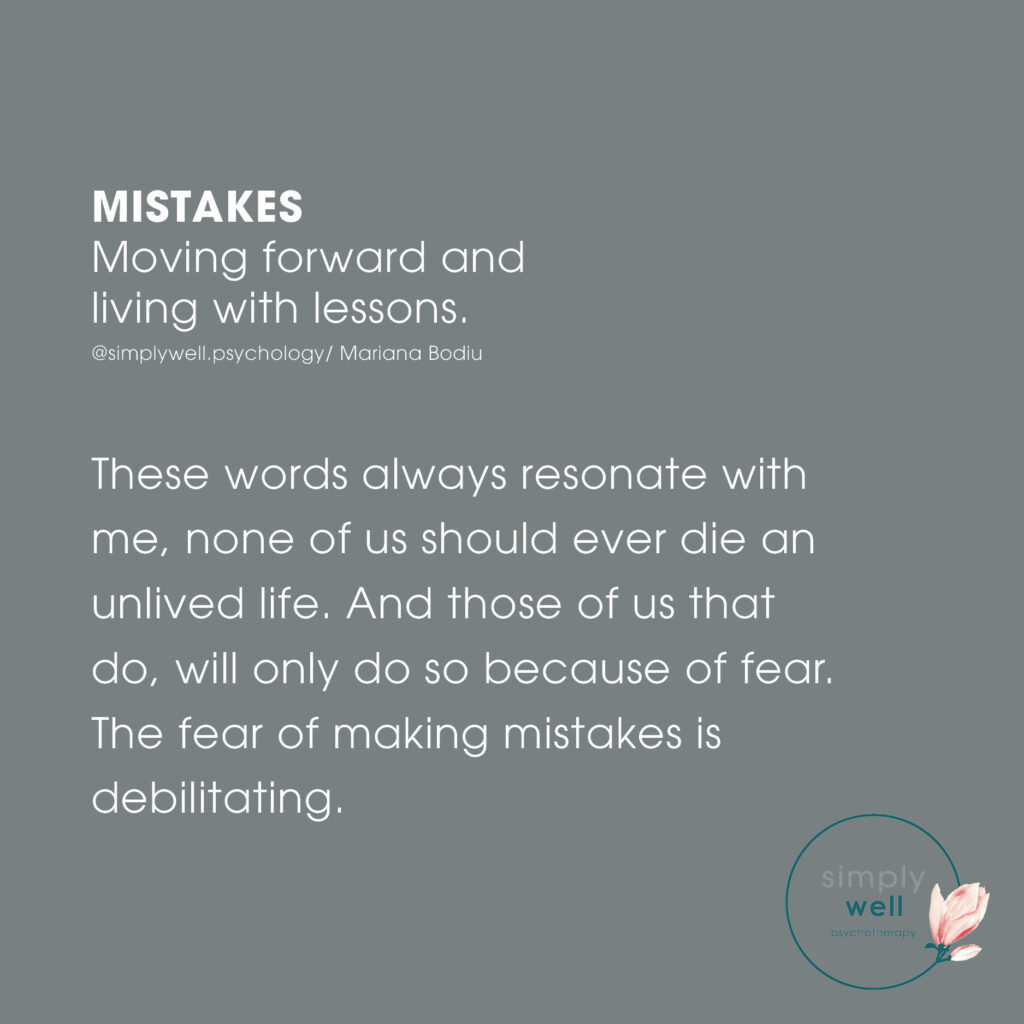
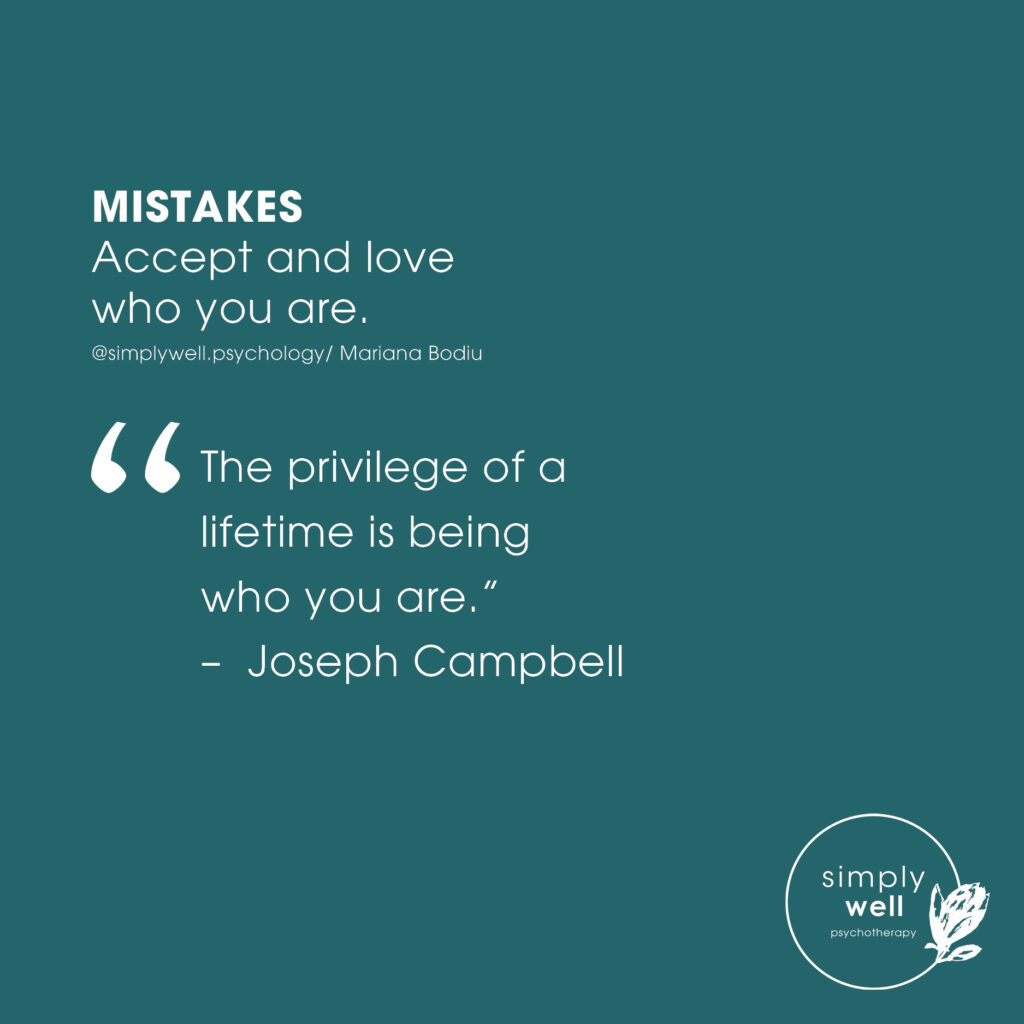
Mistakes always deserve forgiveness
“If we all hold on to the mistake, we can’t see our own glory in the mirror because we have the mistake between our faces and the mirror; we can’t see what we’re capable of being. You can ask forgiveness of others, but in the end the real forgiveness is in one’s own self.” Maya Angelou
Forgive yourself for all your past mistakes and look at all your future mistakes as lessons. As Maya Angelou says we keep that mistake between our faces and the mirror and stop seeing all that we are capable of. Take each one of your mistakes, accept that they happened and forgive yourself. Not all mistakes require forgiveness because they were bad or caused others pain. You may need to forgive yourself for seeing learning opportunities and lessons as mistakes. Forgive yourself for convincing yourself that only perfection is acceptable. Forgive yourself for unrealistic expectations. And do the same for others.
We have looked at how we deal with our own mistakes but how we deal with the mistakes of others also says a lot about ourselves.
- Do you have unrealistic expectations of others?
- How do you react when others make mistakes?
- How easily do you find it to forgive other people’s mistakes?
Moving forward and living with lessons
“I will not die an unlived life. I will not live in fear of falling or catching fire. I choose to inhabit my days, to allow my living to open me, to make me less afraid, more accessible, to loosen my heart until it becomes a wing, a torch, a promise. I choose to risk my significance; to live so that which came to me as a seed goes to the next as a blossom and that which came to me as a blossom, goes on as fruit.” Dawna Markova
These words always resonate with me, none of us should ever die an unlived life. And those of us that do, will only do so because of fear. The fear of making mistakes is debilitating – it stops you from doing just about everything in life. It can stop you from giving your heart, it can stop you from speaking up in a meeting, it can stop you from trying something new, and it prevents improvement and progress.
Changing our perspective has to be a conscious decision. Change your perception of mistakes, they are now lessons! And that goes for other people’s mistakes as well. They are lessons to teach us grace, forgiveness and patience. When a mistake happens and it inevitably will, our first response should be to accept that it happened. Then we can look at what action needs to be implemented and finally what lesson we learned. Always be on the lookout for patterns. Remember people and mistakes will continue to enter your life until you have learned all they have to teach.
Joseph Campbell says, “The privilege of a lifetime is being who you are.”
- Accept and love who you are.
- Accept and love who you are becoming.
- Accept, embrace and appreciate all the lessons that are helping you become stronger, helping you become a better person.
Be who you are, not who others think you should be. We so often see our lessons as mistakes because we are far too concerned with how others will see us.
Banish your inner critic. Embrace the learning, take action, and move forward.
Life is for living.

